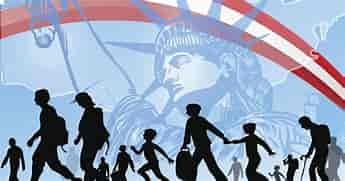Introduction: The Unfolding Story of Immigration in America
Immigration has long been a defining feature of American society. From the first settlers who crossed the Atlantic to the waves of immigrants arriving today, newcomers have shaped the country’s culture, economy, and identity. Whether it’s a dream for a better life, escaping conflict, or pursuing freedom, immigrants have always found their way to the United States. But what is the true impact of immigration on American society? Does it enhance or challenge the country’s fabric? This article explores the multifaceted effects of immigration, examining both its positive and negative aspects, while considering its role in shaping America’s future.

The Economic Contribution of Immigrants
Fueling Economic Growth
Immigrants are key players in America’s economic growth. The U.S. has one of the largest immigrant populations in the world, and their contribution is undeniable. Immigrants make up a significant portion of the workforce, filling jobs in industries ranging from agriculture and construction to healthcare and technology. By working in these sectors, immigrants drive productivity and innovation.
Immigrant Entrepreneurs
One of the most impactful ways immigrants contribute to the economy is through entrepreneurship. Many of America’s successful businesses were founded by immigrants or children of immigrants, from tech giants like Google and Tesla to corner stores and restaurants in local communities. Immigrants not only create jobs for themselves but also for others, fostering economic diversity and helping to drive local economies.

The Role of Immigrants in Innovation
Immigrants contribute to America’s innovation economy. Many come to the U.S. with unique skills, experiences, and perspectives that lead to groundbreaking developments in science, technology, and medicine. The country’s universities and research institutions benefit from the influx of talented individuals who drive new discoveries and inventions. Without this inflow of skilled immigrants, America’s position as a global leader in technology and innovation could be at risk.
Immigrants and the Labor Market
Filling Labor Gaps
The labor market in the U.S. faces continuous challenges in certain sectors, such as agriculture, construction, and hospitality, where many employers struggle to find workers willing to take on low-wage, physically demanding jobs. Immigrants, particularly those from Latin American and Asian countries, often step in to fill these labor gaps. Without their participation, many industries might face significant workforce shortages, which could result in increased costs and disruptions in production.
Impact on Wages
Some critics argue that immigration leads to wage stagnation, particularly for low-skilled American workers. While there is some evidence that increased immigration can depress wages in certain sectors, the overall impact on wages in the economy remains complex. For example, while immigrant labor might lower wages in some industries, it can also raise wages in others by providing businesses with the skilled workforce they need to expand.
Social and Cultural Impact
Enriching American Culture
Immigrants bring diversity that enriches the cultural fabric of America. From food to fashion, music, and language, every corner of American society reflects the influence of immigrants. Cities like New York, Los Angeles, and Chicago are melting pots where different cultural traditions coexist, creating vibrant communities. This diversity fosters tolerance, broadens cultural understanding, and makes the U.S. a more inclusive society.
Language and Education
While the presence of non-English-speaking immigrants might initially seem challenging, it also brings opportunities for cultural exchange. Children of immigrants often become bilingual, contributing to a more linguistically diverse society. In the education sector, immigrant students help drive the demand for foreign language programs and bilingual education, which can open up career opportunities in international relations, business, and diplomacy.
Religious Diversity and Tolerance
Another significant contribution of immigrants to American society is religious diversity. Many immigrants bring their religious beliefs with them, creating a more pluralistic society. This shift challenges the dominant religious norms and encourages broader religious tolerance. In cities with significant immigrant populations, one can find various places of worship, from mosques to Buddhist temples, enriching the religious landscape of the U.S.

Immigration and National Security
Striking a Balance Between Openness and Security
One of the most debated issues surrounding immigration is national security. As a nation that welcomes millions of immigrants, the U.S. must strike a delicate balance between openness and security. While most immigrants contribute positively to society, there are concerns about potential threats posed by extremists who may seek to exploit immigration systems. This has led to heightened scrutiny at borders, more stringent vetting processes, and calls for stricter immigration policies.
The Debate Over Border Security
The topic of border security is often intertwined with immigration debates. While many Americans argue for stronger border protection, others believe that immigrants are unfairly demonized. Proponents of immigration reform call for better policies that provide pathways to legal status for undocumented immigrants while ensuring the security of the nation. Addressing these issues requires finding solutions that support both humanitarian principles and national security.
Political and Policy Considerations
Immigration Reform
The United States has struggled for decades with comprehensive immigration reform. Laws and policies have evolved over time, but the process remains controversial. As the immigrant population continues to grow, so too does the demand for reforms that reflect the realities of a changing society. Debates around immigration policy often focus on the balance between maintaining national security and providing a pathway to citizenship for undocumented individuals who have lived in the U.S. for years.
DACA and Dreamers
The Deferred Action for Childhood Arrivals (DACA) program is a significant policy issue affecting immigrants. The program provides temporary protection from deportation for young immigrants who were brought to the U.S. as children, known as Dreamers. DACA has been a flashpoint in U.S. immigration policy, with legal and political battles over its future. This program highlights the challenges of creating immigration policies that are fair and humane.
The Challenges Immigrants Face
Navigating the Legal System
Immigrants, particularly those without legal status, face numerous challenges as they navigate the U.S. immigration system. The process of obtaining a visa, green card, or citizenship can be long, complex, and expensive. This often leads to uncertainty and fear of deportation, especially for families who have lived in the U.S. for many years. The lack of a clear and efficient immigration system creates unnecessary stress for immigrants and can lead to exploitation.
Discrimination and Xenophobia
Despite the contributions immigrants make to American society, they often face discrimination and prejudice. Immigrants, particularly those from Latin America, Africa, and the Middle East, may encounter racism and xenophobia. This can lead to social isolation, difficulties in finding employment, and even violence. Combatting discrimination requires comprehensive education and policies that promote inclusion and equality.
Immigration’s Role in Shaping America’s Future
A Nation of Immigrants
America’s identity has always been intertwined with immigration. The phrase “nation of immigrants” reflects the enduring belief that the strength of the U.S. lies in its diversity. Immigrants are the lifeblood of American society, fueling its economy, culture, and global influence. As the world continues to change, so too will the immigrant experience, but one thing remains certain: immigration will continue to shape the country for generations to come.
The Future of Immigration Policy
Looking ahead, the future of immigration in the U.S. will likely be shaped by ongoing debates about the role of immigrants in American society. Some policymakers advocate for stricter immigration controls, while others push for more inclusive policies that recognize the contributions of immigrants. The future will depend on finding solutions that balance national security concerns with the need for economic growth and cultural enrichment.
Conclusion: The Ever-Evolving Impact of Immigration
In conclusion, immigration plays a central role in shaping the American experience. From bolstering the economy to enriching cultural life, immigrants have been integral to the nation’s development. Despite facing challenges, including discrimination and legal barriers, the contributions of immigrants continue to define the American story. As the nation looks to the future, it must navigate the complex dynamics of immigration, ensuring that policies support both security and inclusivity. Immigration will continue to influence every aspect of American society, reinforcing its status as a land of opportunity and diversity.
FAQs
1. How do immigrants contribute to the American economy? Immigrants fuel the economy by filling essential jobs, contributing to taxes, and starting businesses. They help drive economic growth, innovation, and diversity, which supports job creation.
2. Are immigrants a burden on U.S. resources? While there are concerns about the cost of social services, research shows that immigrants contribute more to the economy than they take in resources. Many immigrants pay taxes and contribute to the workforce, strengthening the economy.
3. What is the impact of immigration on American culture? Immigrants bring diverse cultural traditions, languages, and customs that enrich American society. This cultural exchange enhances creativity and fosters tolerance, making the U.S. more inclusive and dynamic.
4. What are the challenges immigrants face in the U.S.? Immigrants often face legal challenges, discrimination, and barriers to accessing social services. Many also struggle with navigating the complex immigration system and fear of deportation.
5. How can the U.S. improve its immigration policies? To improve immigration policies, the U.S. needs comprehensive reform that provides clear pathways to legal status, addresses security concerns, and supports immigrant integration into society while promoting fairness and inclusivity.


